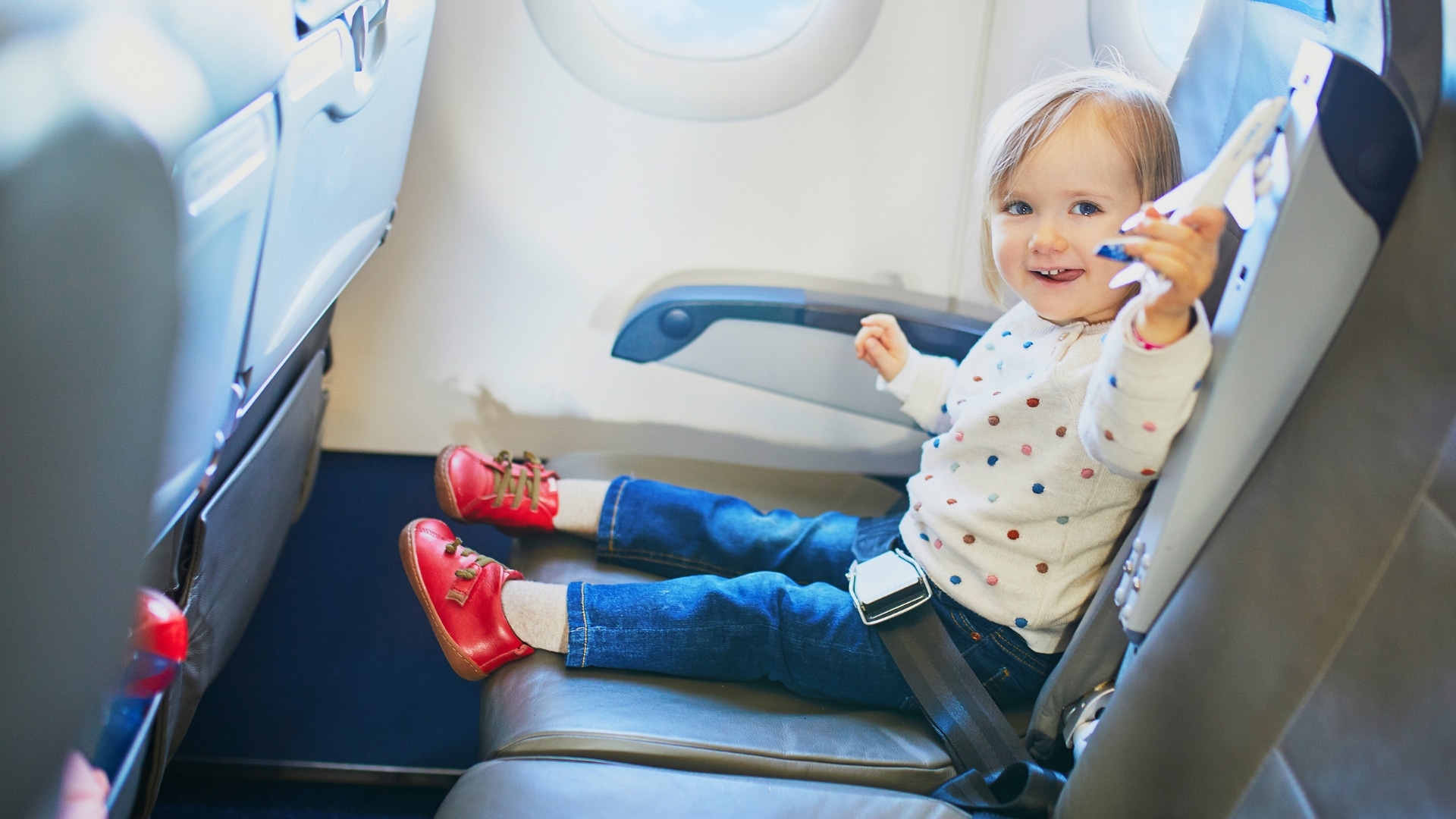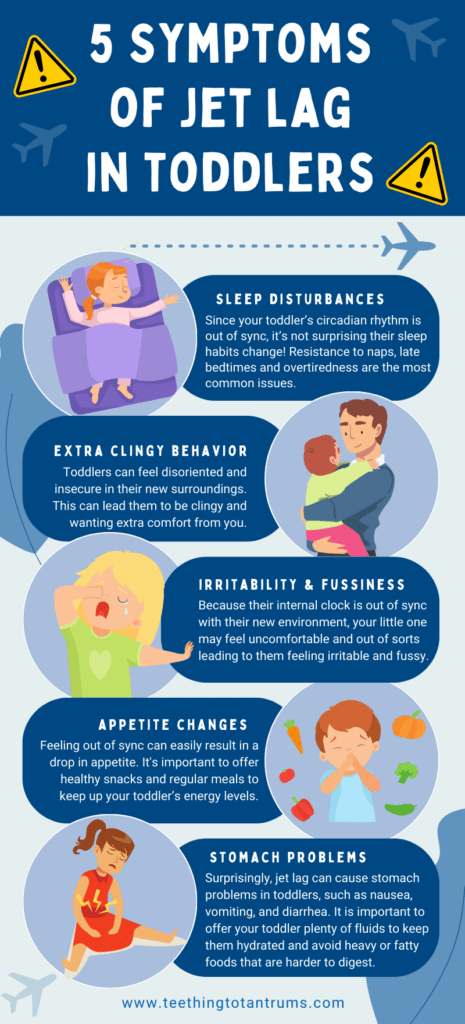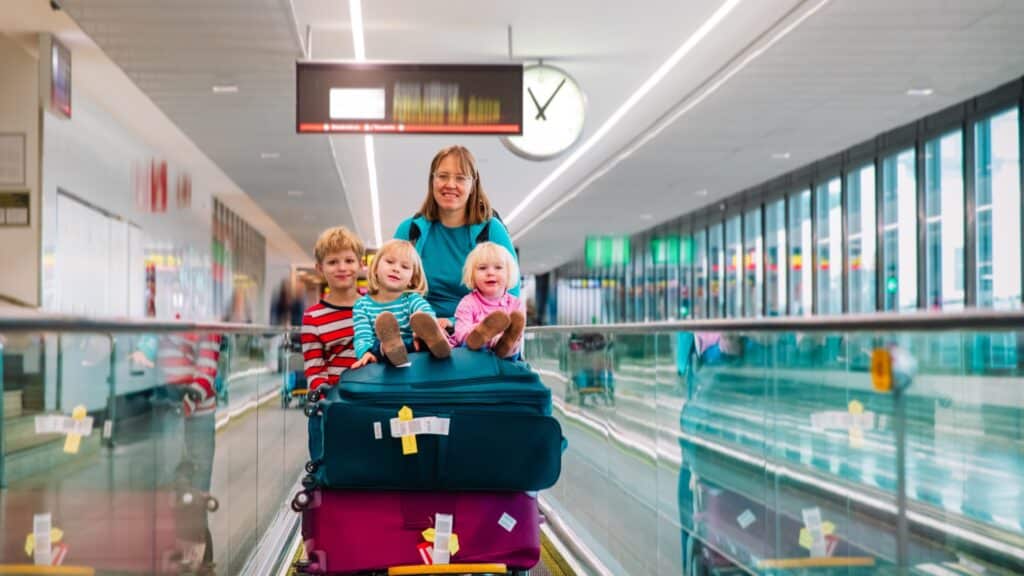Changing time zones can be tough on us, toddlers especially. In this article, I’ll dive into the intricacies of toddler jet lag, including how to recognize its symptoms, how to help your toddler recover quickly, and most importantly, how to prevent it from ruining your vacation!
I’ll also share how to get back on track when you return home so you can enjoy your holiday to the fullest!

Table of Contents
Key Takeaways
- Symptoms of jet lag in toddlers can include sleep disturbances, irritability, appetite changes, stomach problems, and being extra clingy. Understanding these symptoms can help parents identify and manage jet lag.
- To minimize toddler jet lag, try to keep sleep routines consistent, plan morning trips or flights that land in the evening, pay attention to diet, use sunlight to reset circadian rhythms, and recreate bedtime routines.
- It typically takes 3-7 days for toddlers to adjust to a new time zone. Be patient during recovery and adjust schedules gradually. Seek medical advice if symptoms persist beyond a week.
Symptoms Of Jet Lag In Toddlers
Jet lag can be a difficult experience for toddlers (and for you), especially when traveling across multiple time zones. So it’s best to be prepared for what changes to their behavior you are likely to experience.
Here are some common symptoms of jet lag in toddlers that you should be aware of:

- Sleep disturbances. Unsurprisingly, one of the most common symptoms of jet lag in toddlers is sleep disturbances. Since their circadian rhythm is out of kilter your little one is very likely to have trouble falling asleep at night or may wake up earlier than usual in the morning. They may also take shorter naps during the day or refuse to nap altogether.
- Extra clingy. Jet lag can cause toddlers to feel more clingy than usual. They may be hesitant to let you out of their sight and may want to be held or cuddled more often. This is because they are feeling disoriented and insecure in their new surroundings.
- Irritability and fussiness. Toddler jet lag can make your little one feel irritable and fussy. This can easily result in tantrums and toddlers may have a harder time regulating their emotions. Because their internal clock is out of sync with their new environment, your little one may feel uncomfortable and disoriented resulting in them feeling out of sorts.
- Appetite changes. Jet lag can also affect your toddler’s appetite. They may be less interested in food than usual or may want to eat at odd times of the day. It’s important to offer them healthy snacks and meals at regular intervals to help regulate their appetite and keep their energy levels up.
- Stomach problems. Surprisingly, jet lag can cause stomach problems in toddlers, such as nausea, vomiting, and diarrhea. This is because their digestive system can be affected by the disruption in their internal clock. It is important to offer your toddler plenty of fluids to keep them hydrated and avoid heavy or fatty foods that may be harder to digest.
NOTE: A common side effect of traveling long distances and sitting for prolonged times is constipation and bloating. Your toddler may feel very uncomfortable during a flight or train journey, so let them walk up and down the aisle every now and then to keep their digestive system moving.
What Causes Toddler Jet Lag?
Similar to adults, toddler jet lag occurs when children travel across different time zones, and their circadian rhythms become disrupted.
As a result, children may find it difficult to sleep at the right time, leading to fatigue, irritability, and other general symptoms of overtiredness.
Toddlers are more prone to jet lag than adults because their circadian rhythms are still developing, and they have a harder time adjusting to changes in their sleep patterns.
Looking to get your little one to sleep quickly and effortlessly? Check out my Bedtime and Nap Cheat Sheet and master the art of making daytime naps and bedtimes as seamless as possible.
A bedtime & nap cheat sheet so good your little one will ask you to put them to bed...
Laura Williams "This is a life saver! I'm so glad I downloaded your bedtime & nap cheat sheet. My little one actually asked me to put him to bed last night! Unbelievable! Thank you so much!"
Click Here For The FREE Cheat Sheet
5 Top Travel Tips To Minimize Toddler Jet Lag
Traveling with a toddler can be a challenging experience, and this is especially so when it comes to managing their sleep and routines during travel.
All of which are magnified when you also travel across time zones!
However, with a few simple tips, you can help to minimize the effects of jet lag on your little one.

1. Maintain Sleep And Routines During Travel
One of the most important things you can do to minimize toddler jet lag is to try and keep their sleep and routines as consistent as possible during travel.
This means sticking to their regular nap and bedtime sleep schedule as closely as possible, even if it means adjusting your schedule to accommodate them.
If you’re taking a night flight, consider requesting a bassinet or bringing along a travel bed to help your toddler sleep more comfortably.
You can also pack an activity bag with familiar toys and books to help them feel more at home and relaxed during the flight.
2. Plan Short Trips For The Morning And For Long Flights To Land In The Evening
It’s much easier to travel with children in the morning as you do not have to contend with the bedtime routine and most children are also easier to handle in the morning too.
The exception to this rule comes when changing big time zones.
In this instance, you will want to book flights that arrive at your destination in the late afternoon / early evening so you can put your child down to bed at their usual bedtime when you arrive.
3. Dietary Considerations And Jet Lag
Another way to help minimize toddler jet lag is to pay attention to their dietary needs during travel.
Be sure to pack plenty of healthy snacks and meals that your toddler is familiar with, and try to avoid sugary or high-caffeine foods and drinks that can disrupt their sleep and energy levels.
It’s also a good idea to encourage your toddler to stay hydrated during travel, as dehydration can worsen the effects of jet lag. Be sure to pack a refillable water bottle and offer it to your toddler frequently throughout the flight.
TOP TIP: Always choose an aisle seat for your family, so if a toilet break is needed, you can get out quickly!
4. Use Sunlight To Adjust The Circadian Rhythm
One of the most effective ways to help your toddler adjust to a new time zone and minimize jet lag is to get outside every day.
Exposure to sunlight can help reset your toddler’s circadian rhythm by regulating melatonin production and promoting healthy sleep patterns.
If possible, try to schedule outdoor activities and playtime during daylight hours to help your toddler adjust to the new time zone. You can also use blackout curtains to help your toddler sleep more soundly during the night and prevent early morning wakings.
Maintaining a good sleep routine with your baby can be tricky, especially through changing seasons or when you’re away from home! This beautiful blackout blind from Tommee Tippee is made from lightweight premium fabric and completely blocks out daylight, helping to create a dark and sleepy space for baby, no matter where you are!
TOP TIP: Consider using a jet lag calculator to create an adjustment plan for when your family should stay awake, go to bed, and wake up.
5. Recreate Your Toddler’s Bedroom
Finally, maintaining your child’s sleep associations will make a huge difference in helping your little one sleep well when on holiday.
My rule?
If it’s used at home, take it with… or at least a travel-friendly version!
Ensure you pack the white noise machine, night light, blackout blinds, and plenty of cuddly toys if you need to!
Finding the right night light for your child can be quite a task. You want something safe, comforting, and practical. The Cozy Starry Night Light ticks these boxes, with eye-friendly warm lighting and an easy-to-use dimmer.
Its gentle glow makes it the best night light for feeding baby, diaper changes, or comforting your little one back to sleep.
As your baby grows the Cozy Starry Night Light's starry sky projection can provide comfort and gentle quiet time stimulation. Its soft lighting ensures a dreamy, peaceful environment, supporting your baby’s natural sleep cycle.
It really is a fantastic nightlight (at a very reasonable price!)
- Eye-friendly warm lighting with adjustable brightness.
- Includes a timer function for convenience.
- Projects a starry sky that is soothing for little ones.
- Rechargeable battery, so it's very portable.
- A USB adapter is not included for charging.
- The star projector is static without motion (however, this is ideal for very young babies and toddlers).
- Battery life varies based on the brightness settings.
Dealing with Toddler Jet Lag Upon Returning Home
Returning home after a trip with your toddler can be exciting, but it can also be challenging as you deal with the effects of jet lag on the return journey.
Here are some tips to help you and your child deal with toddler jet lag upon returning home.
- First, give yourself and your child time to adjust to the time change. Plan your return trip so that you have a day or two to recover before returning to work, daycare, or kindergarten. This will give you and your child time to rest and recover from the trip allowing them time to resettle back at home and to take extra naps if necessary.
- Next, make sure that your child is well-rested before returning home. If your child is tired and cranky, it will be harder for them to adjust to the time change. Try not to have a too hectic day in the lead-up to your return and try to stick to your child’s regular sleep schedule as much as possible.
- Once you are home, try to stick to your child’s routine as much as possible. This will help them feel more comfortable and secure and will make it easier for them to adjust to the time change. If your child is used to taking a nap at a certain time, try to stick to that schedule even if it means adjusting your schedule. If they don’t want to nap due to jet lag encourage quiet time instead to avoid overtiredness and bring bedtime forward until you have settled back into your usual routine.
- Finally, be flexible and patient. It may take several days or even a week for your child to fully adjust to the time change. During this time, your little one may be more irritable or have trouble sleeping. Try to be patient and understanding, and offer your child plenty of love and support as they adjust to their new routine.

Recovery Time and Toddler Jet Lag
The recovery time for toddler jet lag varies, but it usually takes 3 to 7 days for your toddler to adjust to a new time zone.
During this period, your toddler may experience difficulty sleeping, eating, and playing. They may also be more prone to tantrums and mood swings.
When my son was little, we used to travel to the USA from the UK every year for Christmas. And unless I was prepared in advance, my son’s sleep patterns would be out of whack for at least 4 days when we arrived…
Making our holiday festivities far less enjoyable.
Despite all the lovely activities we had planned, during this time, it was essential that my son’s rest was prioritized. And if your toddler shows signs of jet lag, I highly recommend that you do the same.
A few days of routine-focused rest will make your holiday far less stressful and a lot more pleasant overall.

Special Considerations for Babies and Infants
Jet lag can be particularly challenging when traveling with babies as well as a toddler.
An infant’s sleep patterns are already erratic, and the disruption caused by a long flight can make things even more difficult resulting in it being difficult to settle them to sleep and them waking erratically.
Combine that with an overtired toddler and you’ve got a disaster waiting to happen.
However, here are some special considerations to keep in mind when dealing with baby jet lag:
- Adjust their sleep schedule before the trip: If possible, try to get your baby acclimated to the new time zone before you leave. This may mean shifting their sleep schedule gradually in the days leading up to your trip.
- Stick to their routine as much as possible: Babies thrive on routine, so try to maintain their usual schedule as much as possible. This includes feeding times, nap times, and bedtime.
- Be patient: It may take a few days for your baby to adjust to the new time zone, so be patient and understanding. Try to keep them calm and relaxed during this time, and avoid overstimulating them with new activities or environments.
- Use light to your advantage: Light is a powerful tool for regulating sleep, so use it to your advantage. During the day, expose your baby to natural sunlight as much as possible. At night, keep the room dark and use blackout curtains or shades to block out any light that might disturb their sleep. Use a portable white noise machine to stop strange ambient noises disturbing them.
- Consider medication: In some cases, medication may be necessary to help your baby adjust to the new time zone. Talk to your pediatrician about whether this might be a good option for your child. Read my post about baby melatonin to learn more.
Remember, every child is different, and what works for one may not work for another. Be flexible, stay calm, and do your best to help your baby and toddler adjust to their new time zone as smoothly as possible.
When to Seek Medical Advice for Toddler Jet Lag
If your toddler is experiencing symptoms of jet lag that are interfering with their sleep or daily activities for longer than a week, it is time to seek medical advice.
A doctor or pediatrician can provide guidance on how to manage jet lag and may recommend melatonin, a hormone that can help regulate sleep patterns.
NOTE: Melatonin should only be used under the guidance of a healthcare professional.
Frequently Asked Questions About Toddler Jet Lag
Looking for more information about toddler jet lag? Here are the most commonly asked questions, answered just for you.
Q: How can I help my toddler adjust to a new time zone?
A: To help your toddler adjust to a new time zone, you can start by gradually shifting your toddler’s sleep schedule a few days before your trip. I recommend working the bedtime forwards or backward by 10-15 minutes a night. Once you arrive at your destination, try to get your toddler outside during daylight hours to help reset their internal clock. You can also try to keep your toddler active during the day to help them sleep better at night. Use black-out blinds to help prevent early waking.
Q: What are the symptoms of jet lag in babies?
A: Jet lag can affect babies in different ways, but some common symptoms include difficulty sleeping, irritability, and changes in appetite. Babies may also experience changes in their bowel movements and may be more prone to fussiness and crying.
Q: How long does jet lag usually last for toddlers?
A: The duration of jet lag can vary, but it typically takes toddlers 3 to 7 days to adjust to a new time zone. During this time, your toddler may experience changes in their sleep patterns, appetite, and mood. It’s important to be patient and understanding during this time, as your toddler may be feeling tired and cranky.
Q: Is it safe to give toddlers melatonin for a flight?
A: Melatonin is a hormone that can help regulate sleep, and some parents may consider giving their toddlers melatonin to help them sleep during a flight. However, you should never give your toddler melatonin without consulting your pediatrician, as it can have side effects and may not be safe for all children. Read my post on baby melatonin to learn more.
Q: What can I do to help my toddler sleep during travel?
A: To help your toddler sleep during travel, try to create a comfortable sleep environment by bringing along familiar items such as a favorite blanket or stuffed animal. You can also try to schedule your flights during your toddler’s regular nap or sleep time. Additionally, you can try to tire your toddler out with physical activity before your flight to help them sleep better but be careful to avoid them becoming overtired as then they will struggle to settle.
Need More Parenting Help?
- Download our FREE Bedtime & Nap Sleep Cheat Sheet. It’s a free, easy-to-use and proven formula designed for parents of 0-5 year olds to master the art of consistently undisturbed and restful sleep without the yelling, nagging or exhausting long-winded evenings.
- Check out our Parenting Toolbox. You’ll get access to expertly-chosen products that you can guarantee are the best for your little one and your wallet.
- Are you looking for personalized guidance to navigate the challenges of parenting? I offer 1-on-1 consultations to bring you tailored strategies and actionable advice to help support your child's growth and well-being with confidence.

A bedtime & nap cheat sheet so good your little one will ask you to put them to bed...
Laura Williams "This is a life saver! I'm so glad I downloaded your bedtime & nap cheat sheet. My little one actually asked me to put him to bed last night! Unbelievable! Thank you so much!"
Click Here For The FREE Cheat Sheet




